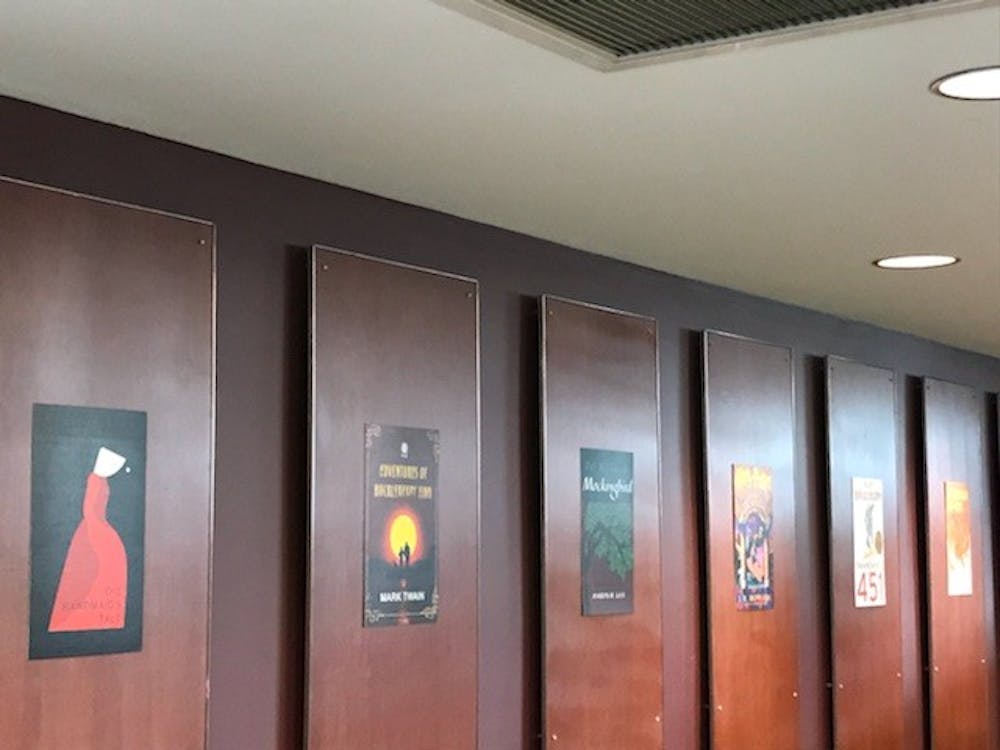The UB Libraries participated in the American Library Association’s Banned Books Week by holding events on both Sept. 26 and Sept. 27.
The event focused on censorship in literary works and screen adaptations. Students, faculty and staff read from controversial and banned pieces.
Works included texts like “To Kill a Mockingbird” by Harper Lee, “America” by Allen Ginsberg, “Meditations on First Philosophy” by René Descartes and “The Hate U Give” by Angie Thomas.
The crowd at Wednesday’s read-out was composed of roughly twenty dedicated audience members and many passers-by. Thursdays event attracted a slightly smaller crowd.
Kathleen Quinlivan, communications officer for UB Libraries, discussed the premise of the event as well as the role UB plays in giving specific texts a larger voice.
“Banned Books Week is an initiative from the American Library Association and the Freedom to Read Foundation, and they felt it was important to draw attention to the fact that individuals and groups from time to time challenge the fact that certain materials are available on library shelves,” Quinlivan said.
“Parent, groups or individuals might object to certain language –– certain ideas –– and they would want materials removed from libraries. We feel it is important to keep all points of view open.”
The two-part event continued into Thursday, with a screening of Francois Truffaut’s adaptation of “Fahrenheit 451” in 310 Capen.
Jonathan Manes, assistant clinical professor at the UB School of Law, gave a short talk before the screening of “Fahrenheit 451” to launch Thursday’s event.
“When we talk about censorship, we’re not talking about literally preventing someone from speaking, we’re not talking about tape over your mouth,” Manes said. “ We’re talking about interrupting the chain that leads from the author to the audience ... preventing speech from finding an audience.”
Manes expressed the need to stand up against censorship in all incarnations, saying that it's necessary to “stand up and fight against potential government censorship”
Students shared their opinions about censorship.
Rhett Boswell, an undergraduate history major, spoke up about the dangers of censorship.
“Censorship in general is always a sign of a kind of an authoritarian regime, a possible attack on civil liberties,” Boswell said. “If you see the signs of people trying to ban books [or] people starting to burn books, you know you’re heading down the wrong path.”
Other students, such as media studies major Lewuga Benson, said that in extreme circumstances, censorship is appropriate.
“I think if it’s too controversial, then it should be banned,” Benson said.
Manes also discussed historical attempts at censorship.
“The way that authors now reach their audiences –– or information reaches audiences –– is through a very small number of platforms [like] Facebook, Twitter, Google search, Amazon, maybe a few others, and that change is important for a few reasons,” Manes said. “These days, if you think about it, you don’t have to burn the books to prevent radical ideas to effectively reach an audience. Instead you can shut down the website, or deplatform the content provider to use the current terms, have all of the small number of online outlets to refuse to publish or sell certain authors or a book.”
Julian Roberts-Grmela is an arts staff writer and can be reached at arts@ubspectrum.com

Julian Roberts-Grmela is a senior news editor for The Spectrum and an English and philosophy major. His favorite book is “White Teeth” by Zadie Smith and he hopes that one day his writing will be as good as hers.





